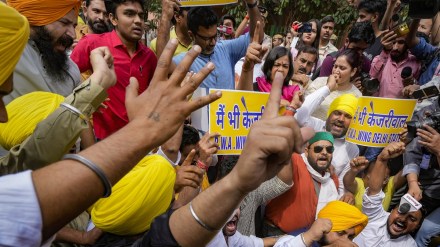India has taken `strong objection’ to the remarks of the Spokesperson of the US State Department about certain legal proceedings in India. The Acting US Deputy Ambassador Gloria and was summoned by the Ministry of External Affairs (MEA) to address concerns regarding comments made by the State Department over the recent arrest of Delhi Chief Minister Arvind Kejriwal. The meeting lasted for around 40 minutes and, India expressed “strong displeasure,” the Ministry of External Affairs (MEA) said. Adding, “states are expected to be respectful of the sovereignty and internal affairs of others.”
This is what Ministry of External Affairs said
An official statement issued by the MEA on Wednesday (March 27, 2024), states: “In diplomacy, states are expected to be respectful of the sovereignty and internal affairs of others. This responsibility is even more so in case of fellow democracies. It could otherwise end up setting unhealthy precedents.”
Adding, “India’s legal processes are based on an independent judiciary which is committed to objective and timely outcomes. Casting aspersions on that is unwarranted.”
This development comes a few days after Georg Enzweiler, German Deputy Chief of Mission in New Delhi, was summoned. And India had conveyed strong protest regarding their Foreign Office Spokesperson’s comments on its internal affairs. On Saturday in a statement MEA had said: “We see such remarks as interfering in our judicial process and undermining the independence of our judiciary.”
Background
On Tuesday, the US administration said that it is closely monitoring the situation surrounding the arrest of Arvind Kejriwal and has advised the Indian authorities to ensure a fair and transparent legal process for the detained Delhi Chief Minister and opposition leader.
Similarly, Germany’s Foreign Office emphasized that Kejriwal, like any other Indian citizen facing legal charges, is entitled to a fair and impartial trial.
India had strongly reacted to Germany’s statement, denouncing it as interference in its internal affairs and had expressed its firm stance against what it perceived as biased assumptions and unwarranted meddling in its judicial processes.
Arvind Kejriwal’s arrest by the Enforcement Directorate, following a raid at his residence, has sparked protests in Delhi. He faces allegations related to a liquor policy scam, adding a political dimension to the situation, especially ahead of the 2024 Lok Sabha election.
Opposition parties, including Congress, Trinamool Congress, and DMK, have condemned Kejriwal’s arrest, alleging political motives behind the action. This sentiment was echoed by AAP supporters, who protested in Delhi, with some facing detention by the authorities.
On the other hand, the Bharatiya Janata Party (BJP) has called for Kejriwal’s resignation and denied allegations of using central investigative agencies for political advantage. Despite the ongoing controversy, the political landscape remains tense, with conflicting perspectives on the nature of Kejriwal’s arrest and its implications for Indian democracy.
